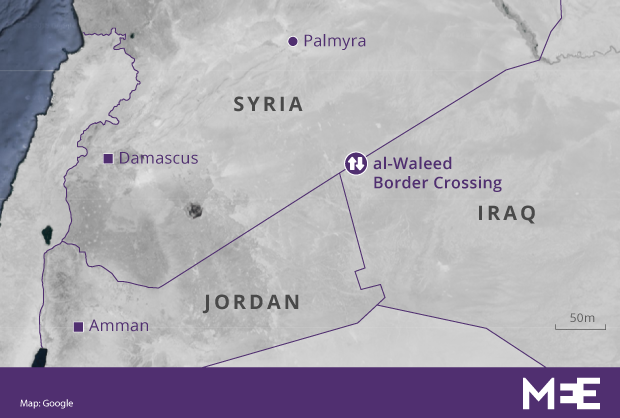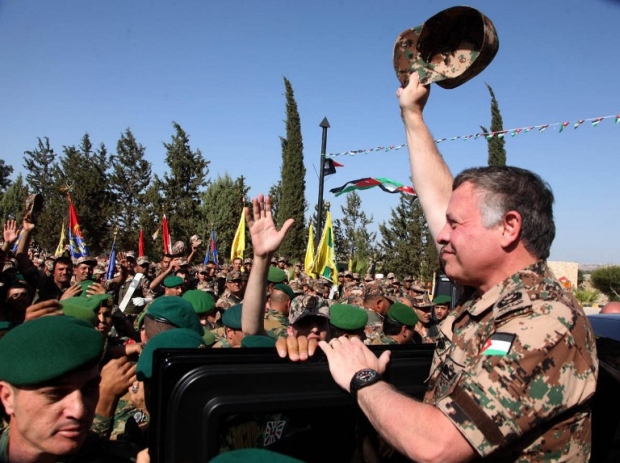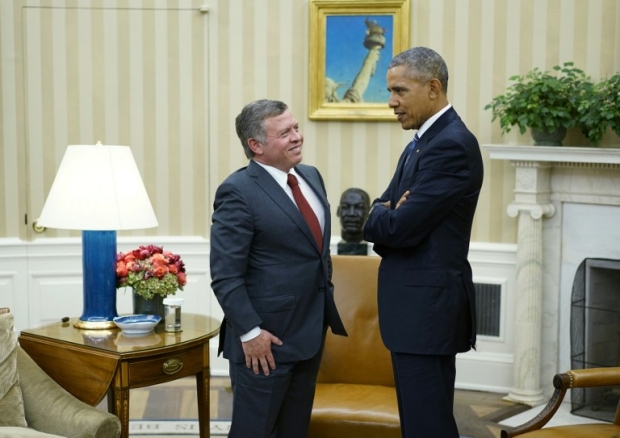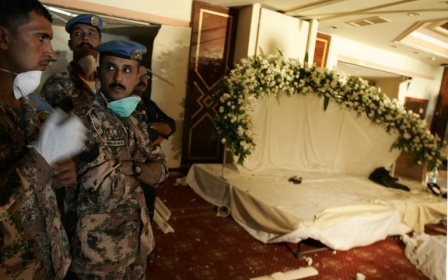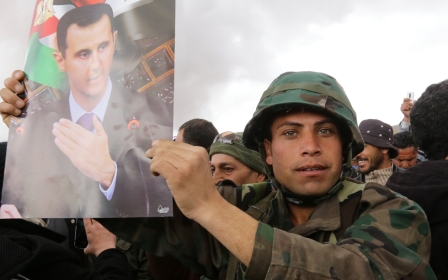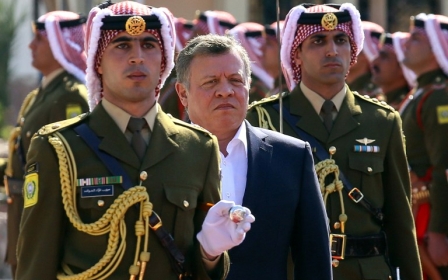EXCLUSIVE: Jordan begins covert operations against IS in Syria
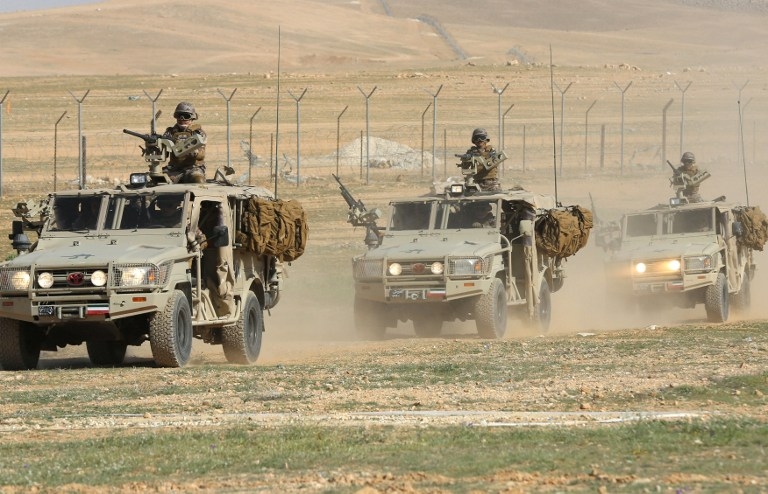
Jordan sent troops to retake a key Syria-Iraqi border crossing from Islamic State (IS) fighters in support of a wider campaign against the militant group in Syria, Middle East Eye can reveal.
King Abdullah II revealed the preparation of two special forces battalions for the covert action during a briefing in January to top-level US congressional members, including John McCain and Paul Ryan, telling the politicians that troops with “some balls” were needed to fight IS, according to a detailed account of the meeting seen by MEE.
One battalion, drawn from men from Syria's southern tribes, was assessed by the British and is led by a Syrian commander, the king said.
He said a second battalion was moving as of mid-January towards al-Waleed border crossing, about 240km southeast of Palmyra, to cut IS routes between Iraq and Syria. In early March, US-backed "New Syrian Army" rebels captured the crossing from IS.
A source in contact with rebel fighters in Syria told MEE that Jordanian forces helped the rebels retake the crossing. Jordanian and US Central Command officials had not responded to MEE's request for comment by the time of this story's publication.
The current whereabouts of the Jordanian-trained, British-assessed troops is however unknown - Syrian government forces in the last few days have themselves advanced into Palmyra, as IS urged civilians to flee the city. A source in contact with rebel fighters in Palmyra told MEE this week that there was no evidence of them in the area.
Jordan’s king said he had built a strong relationship with Britain and was working together with their special forces because Amman “had challenges about getting responses from the US”. He said Jordan and Britain had formed "a systematic approach to dealing with Palmyra".
The British Ministry of Defence declined to comment for this story. None of the congressional members who attended the meeting responded to requests for comment before publication.
Royal Court Political Director Manar Dabbas, who also attended the meeting, referred MEE to the Jordanian Royal Court's media adviser for comment, adding: "The discussions we had in Washington were off the record."
Crispin Blunt, a British MP and chairman of the influential parliamentary foreign affairs committee, told MEE that he was not aware of a British-Jordanian Palmyra strategy and had not heard the details about the battalions, but said he had “been aware that Jordan is up for playing a really constructive role with the international coalition in Syria, so that wouldn’t come as a surprise”.
With Syrian and Russian anti-aircraft defence systems extending around Palmyra, Abdullah repeatedly said Jordan would need to coordinate with Moscow, raising questions about whether his kingdom may now be fighting IS alongside Russia, and by extension, Assad.
“We need to coordinate with the Russians from the Jordanian perspective in Palmyra and Deir Ezzor where we are preparing for air strikes and special forces operations and so de-confliction makes a lot of sense to us,” he said.
“In some areas, unless we coordinate with Russians, we cannot go after ISIL [Islamic State]. So we have to make up our minds.”
The plan outlined by the king comes amid lingering frustration among America’s top allies who fear US strategy in the five-year-old Syrian war is incoherent and ineffective.
The king expressed frustration over American hesitance to prioritise the destruction of IS over the exit of Syrian President Bashar al-Assad who, he said, would be voted out through an election within the next six months.
“For us, as bad as Assad is, ISIL is the main enemy,” he said.
The king and his foreign minister, Nasser Judeh, told the Americans that Jordanian officials had been in contact with both the Syrian opposition and government to find a replacement for Assad. The position had already been declined by an ex-general and ex-prime minister who had both defected to Jordan, they said.
Abdullah, who trained as a special forces officer and under whose leadership Jordan has become renowned as the Middle East’s special operations training and equipment capital, told members of the US government that the US-led air campaign alone would not destroy IS.
“The US should ask itself why did ISIL get to where it is now,” he said. “This is unacceptable.”
Limited but expanding role
Jordan has conducted limited air strikes against IS targets in Syria, and has also supported CIA and US activities, hosting training camps for opposition fighters and facilitating weapons, ammunition and fighters across its border.
Additionally, Jordan’s General Intelligence Directorate has cultivated agents and informants inside IS territory and also in Syrian and Iraqi opposition groups.
All analysts and former high-ranking military officials spoken to by MEE agreed that the US-led campaign against IS will only succeed if its air campaign is complemented by ground troops.
However, some questioned what difference Jordanian special forces could actually make at this point – and why the focus in January was apparently on Palmyra.
Analysts with whom MEE spoke said Jordan would face a choice on who it fought alongside if it widened its strategy further.
King Abdullah, some say, is more interested in positioning Jordan for a post-IS Syria in which he and his advisers are fairly certain Assad will continue to lead.
Jordan, alongside Saudi Arabia, was one of the first countries to publicly call for a teetering Assad to step down. Five years later, Assad’s position is stronger - leaving Amman in a vulnerable position.
“They are looking at a scenario where, quite possibly, in five to 10 years, IS could be gone, but the Assad government will still be there,” said Sean Yom, Assistant Professor of Political Science at Temple University in Philadelphia.
“The Jordanians are going to have to find a way, with pie on their face, to say ‘Remember the time when we said you should leave?’” he said. “They have to play chess, not checkers. They have to think five moves ahead.”
Assad anxiety
During the discussion in Washington with US politicians, Abdullah and Judeh repeatedly assured them that the diplomatic process now under way in Geneva would result in Assad losing in elections.
But Yom and others say that’s very unlikely to happen – and Abdullah and Judeh know it.
Thomas Pierret, a lecturer in contemporary Islam at the University of Edinburgh, said: “They don’t believe a word about the elections – who believes that?"
Yom said high-level contacts in the Jordanian government had told him they were planning for Assad to stay.
Jordan began a short-lived bombing campaign against IS in Syria last February after the group burned captured Jordanian pilot Muath al-Kassasbeh to death.
In a closed meeting with US politicians, Jordan's king reportedly quoted lines from the Clint Eastwood film Unforgiven and vowed to battle IS until he ran “out of fuel and bullets”.
However, Syria’s foreign minister, Walid Muallem, warned Jordan that his country did not need help fighting IS and would not accept foreign ground troops on Syrian territory.
"We will not allow anyone to violate our national sovereignty,” he said.
“During that whole campaign, the Jordanians made it abundantly clear this was not an attack of any kind of action against the Assad government,” Yom said. “They were sending their gofers through all the private channels [to Syria] to emphasise that.”
The aid game
Yom said that Jordan’s priorities remain the same a year later: Keep a healthy distance from Assad and sustain foreign aid flows, and that’s why Abdullah and Nasser play up the elections angle even if they don’t believe it.
“They need to have a bone to throw the Americans," he said. "‘We are on board with this long term plan to beat IS, to defeat the Assad government and have a free and fair election, and then we are all going to vote in this really awesome, secular, pro-Western government in Damascus and they will be our best friend’.
“They know it’s a game he’s playing so they go along with it, and the next time that the Jordanians need foreign aid, they go along with knowing it’s a game he has to play – and Abdullah and his people know that they know it’s a game.”
It was not just the loss of American money that will concern Jordan if it breaks from the anti-Assad alliance, but also funding from Saudi Arabia, which has given Amman as much as $5bn in aid since 2011 and might pull the plug, Yom said.
“When the Jordanians talk to the Saudis and the Egyptians, they are not saying the same thing [as they do to the Americans],” Yom said. “When they talk to Saudis in particular, they adopt a very hard line, anti-Syrian stance.”
While the Saudis provide financial aid, Pierret said, Jordan will be intimately aware that the kingdom cannot provide deterrence. “If things sour between Syria and Jordan, they are on their own,” he said.
Order problem?
Abdullah’s call for action comes after what a former top-ranking British military official told MEE has been a “woefully inadequate” Western strategy to defeat IS.
“Many of King Abdullah’s instincts are spot on,” said the official, who requested anonymity.
“The idea that, early on, you could somehow initially get rid of Assad and then, when IS grew because you failed to do that effectively, you could somehow barter Assad out of it and still defeat IS concurrently was naive in the extreme,” he said.
“That’s clearly a complaint on King Abdullah’s part – and it’s one I’d share,” he added.
But even if the battle against IS was prioritised across the coalition ahead of an Assad exit, significant problems remain, say some analysts.
“The reason why the IS-then-Assad strategy can’t work is because once IS is gone ... there would be no incentive for Assad to go,” said Kyle Orton, a Middle East analyst and associate fellow at the London-based Henry Jackson Society. “He would just stay then, which is, by the way, what the Russians plan to do anyway.”
Middle East Eye propose une couverture et une analyse indépendantes et incomparables du Moyen-Orient, de l’Afrique du Nord et d’autres régions du monde. Pour en savoir plus sur la reprise de ce contenu et les frais qui s’appliquent, veuillez remplir ce formulaire [en anglais]. Pour en savoir plus sur MEE, cliquez ici [en anglais].


